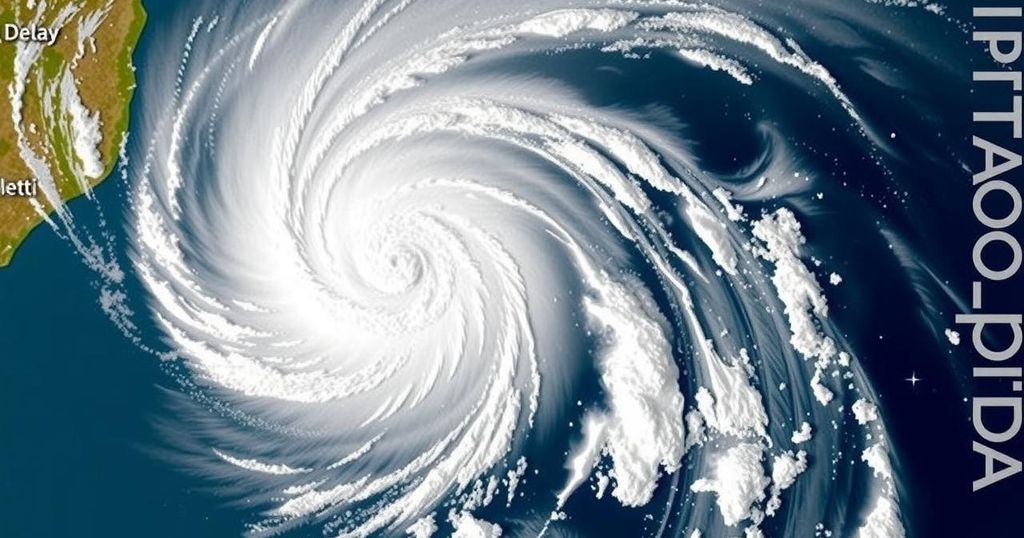Malawi Prepares for Tropical Cyclone Chido Amidst Ongoing Challenges
Malawi is on high alert as Tropical Cyclone Chido approaches, expected to bring heavy rain and flooding to southern districts. With maximum winds of 250 km/h, the cyclone is anticipated to make landfall in Mozambique, exacerbating food insecurity already affected by El Niño. Emergency preparations are underway, and humanitarian organizations are mobilizing resources to assist impacted communities.
Malawi is currently on high alert in anticipation of Tropical Cyclone Chido, which is projected to inflict significant rainfall and flooding on the southern regions of the nation. The Malawi Department of Climate Change and Meteorological Services has reported that Chido, located northeast of Madagascar in the Indian Ocean, is maintaining maximum wind speeds of 250 kilometers per hour. The cyclone is expected to persist with this intensity through Saturday afternoon as it progresses westward at a speed of 22 kilometers per hour, raising concerns about substantial rainfall in the affected areas.
Cyclone Chido is anticipated to traverse 11 districts in southern Malawi, including Mangochi, Machinga, Phalombe, Balaka, Mulanje, Blantyre, Thyolo, Chiradzulu, Zomba, Mwanza, and Neno. Its landfall is forecasted for Sunday near the coastal city of Nacala in Mozambique, with heavy rain and flooding expected to affect certain areas until Tuesday. Chipiliro Khamula, the spokesperson for the Department of Disaster Management Affairs, urged residents in flood-prone zones to relocate to higher ground and comply with evacuation directives.
“We have alerted all [district] councils and activated all clusters for swift preparatory and anticipatory actions,” Khamula emphasized. Additionally, emergency plans have been put into place for the mobilization of a search-and-rescue team, incorporating personnel from the Malawi Defense Force, the Malawi Police Service, the Marine Department, and the Malawi Red Cross Society.
This cyclone emerges one year after the devastating effects of Cyclone Freddy, which resulted in over 1,000 fatalities in southern Malawi and caused extensive crop and livestock losses. The implications of Cyclone Chido are compounded by the ongoing challenges posed by El Niño, which has inflicted drought conditions and food shortages on more than a quarter of Malawi’s population of 20 million. Paul Turnbull, the country director for the World Food Program (WFP) in Malawi, indicated that food stocks are prepared in response to both El Niño and the impending crisis from the cyclone. He commented, “If food is needed to respond to Cyclone Chido, WFP will be seeking support to cover these costs so that we would not compromise the support for the ongoing El Niño response.”
Furthermore, the WFP has secured boats to assist the Malawian government’s efforts to deliver food and conduct rescues in the aftermath of the flooding resulting from the cyclone.
The topic surrounding Tropical Cyclone Chido highlights the serious threats posed by severe weather events in Malawi, particularly following the recent experiences with Cyclone Freddy, which resulted in catastrophic damage and loss of life. Malawi is prone to cyclones due to its geographical location, leading to recurrent flooding and food shortages, especially in light of challenging weather patterns driven by phenomena such as El Niño. Understanding these climatic trends is essential in addressing the humanitarian impact on the population, with organizations like the WFP playing a critical role in disaster response and food security.
In conclusion, the emergence of Tropical Cyclone Chido presents a significant risk to Malawi, with expectations of heavy rainfall and flooding in the southern regions. In light of previous devastating cyclones and ongoing food insecurity exacerbated by El Niño, authorities and humanitarian organizations are preparing comprehensive responses to mitigate the cyclone’s impact. The collective efforts of local councils and agencies aim to safeguard the population and ensure the provision of necessary food assistance during this critical time.
Original Source: www.voanews.com




Post Comment